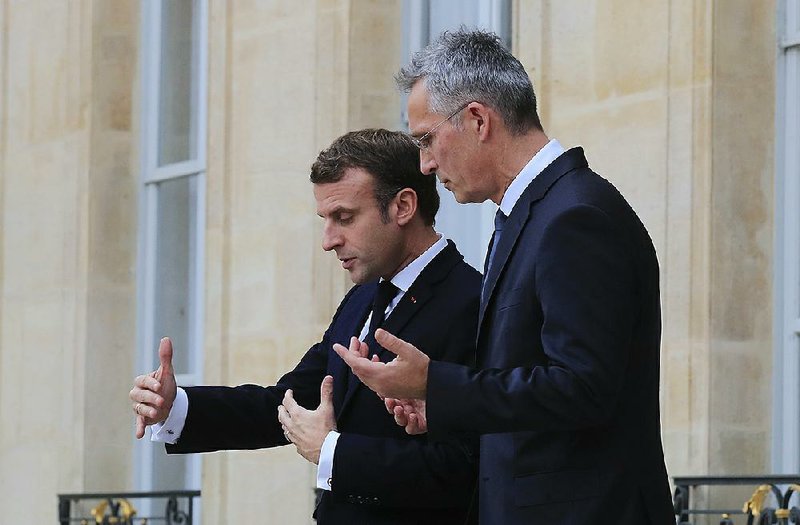PARIS -- NATO leaders must stop bickering over defense spending and have a deep discussion about the future of the military alliance and how ties with Russia can be improved at a summit, French President Emmanuel Macron said Thursday.
Macron's call for intensive talks on how to shore up security in Europe, cope with volatile member Turkey and restore U.S. leadership came as NATO Secretary-General Jens Stoltenberg said Washington will pay less into the alliance's budget from next year, with Germany filling the spending gap.
Ahead of a summit of NATO leaders in London next week, Macron held discussions with Stoltenberg in Paris.
At a joint news conference, Macron posed a series of questions about NATO, an organization that he termed as "brain dead" just a few weeks ago, an accusation that was criticized by others within the alliance.
"NATO is an organization of collective defense. Against what, against who is it defending itself? Who is our common enemy? What are our common topics? This question deserves clarifications."
Macron said he was glad his recent comments have acted as a "wake-up call" and that it was "irresponsible" to just talk about financial and technical matters.
"A wake-up call was necessary," Macron insisted after much criticism of his language. "I'm glad it was delivered, and I'm glad everyone now thinks we should rather think about our strategic goals."
Too much emphasis was put on military spending, Macron added, and not enough on strategy. France, a nuclear power, is among the NATO members not meeting the alliance's target for military spending.
"A real alliance is action, decisions, not words. So, I want us to have a real dialogue among allies," he insisted.
Macron complained that NATO's two previous summits have focused almost exclusively on defense spending and "how to alleviate the financial cost for the United States."
At the Tuesday-Wednesday summit in London, President Donald Trump is expected to repeat his demand that European nations and Canada increase their defense spending. The U.S. spends more on defense than all other 28 allies combined.
In an announcement Thursday, Stoltenberg said the allies have agreed to reformulate NATO's relatively small in-house budget and that Washington would now pay less.
NATO allies agreed last year to a 2019 civil budget for running things like the organization's headquarters of $250.5 million. A further $1.4 billion was earmarked for spending on military missions around the world.
But Stoltenberg said Thursday that a new cost-sharing formula has been agreed and that "the U.S. will pay less, Germany will pay more."
Washington was previously the biggest contributor, paying about 22%. Stoltenberg said the U.S. and Germany will now both pay "roughly 16%."
The changes become effective in 2021, according to a NATO diplomat.
The NATO budget is separate from the 2% of gross domestic product that each NATO member has agreed as their goal for military spending by 2024.
Other countries in the alliance have increased their military spending since the Russian annexation of Crimea five years ago by about $130 billion, a NATO diplomat said, a figure that Stoltenberg is expected to announce next week.
Even so, only eight of the 29 member countries meet the 2% goal.
The move does not concern the national defense budgets that Trump routinely complains about but could help to mollify him. It came a day after NATO announced a $1 billion contract to refurbish its aging fleet of surveillance planes made by U.S. aircraft manufacturer Boeing.
Macron said France won't increase its contributions for NATO's in-house budget and referred to the 13 French soldiers killed in a helicopter collision as they were fighting Islamic State group-linked extremists in Mali.
"If anyone wants to see what they call cost sharing, they can come to the ceremony that France is organizing on Monday," he said. "They will see the price."
Macron said NATO really needs to focus on what it's about, to resolve a series of questions, such as how to maintain peace in Europe, relations with Russia, the role of Turkey in NATO and who the alliance's enemies might be.
He called for a return to dialogue with Russia that is "lucid, robust and demanding" in order to enhance confidence and security on the continent. NATO's relations with Russia have arguably been at their frostiest since the end of the Cold War as a result of Russia's annexation of Ukraine's Crimean Peninsula in 2014.
Macron added that the alliance needs to focus on the common enemy, which he said is neither Russia nor China, but extremist groups.
Despite the in-fighting, Stoltenberg played down the divisions and insisted that NATO was as relevant as it has ever been.
"In uncertain times we need strong multinational institutions like NATO," he said.
"The paradox is that while questions are being asked about the strength of the trans-Atlantic bond, North America and Europe are doing more together than they have done for decades."
Macron also lamented the collapse of the Intermediate-Range Nuclear Forces Treaty, which the U.S. abandoned after insisting that Russia was violating the pact. The treaty was a Cold War-era bilateral agreement between Washington and Moscow.
"To say that a treaty is over without having anything else in place," he said. "Let's be serious. We're talking about Europe's security."
Information for this article was contributed by Sylvie Corbet and Lorne Cook of The Associated Press and by Steven Erlanger of The New York Times.
A Section on 11/29/2019
